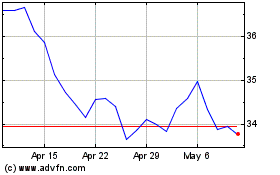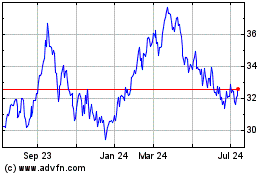University of Tokyo's Dr. Akira Isogai and Kyoto University's Dr. Hiroyuki Yano Receive the Honda Prize 2016
September 29 2016 - 12:02AM
JCN Newswire (English)
Honda Foundation, a public-interest incorporated foundation
created by Soichiro Honda, the founder of Honda Motor Co., Ltd.,
and his younger brother Benjiro Honda and currently headed by
Hiroto Ishida, is pleased to announce that the Honda Prize 2016(1)
will be awarded to Dr. Akira Isogai, professor of the Graduate
School of Agricultural and Life Sciences at The University of
Tokyo, and Dr. Hiroyuki Yano, professor of the Division of Creative
Research and Development of Humanosphere, Research Institute for
Sustainable Humanosphere at Kyoto University, who have made
tremendous contributions to the development of high-efficiency
production methods of Cellulose Nanofiber (CNF), its application to
products, and the enhancement of its potential for further
utilization.
Dr. Isogai and Dr. Yano are the 37th laureates of the Honda Prize.
The award ceremony will be held at the Imperial Hotel in Tokyo on
November 17, 2016. In addition to the prize medal and certificate,
the laureates will be awarded 10 million yen in total.
CNF is a general term for a bundle of cellulose microfibril that is
a basic structure substance of plant cell wall. This nanofiber is
one-fifth the weight of steel and five times or more its strength
while it has one-fiftieth of linear thermal expansion coefficient
of glass. It is a plant-derived, environment-friendly and
sustainable resource, which accounts for 50% or more of plant
resources, such as wood, and can be found abundantly on earth.
Toward early realization of a low-carbon society, it is attracting
attention for its utilization as a substitute for petroleum-based
plastics, a reinforcing fiber for structural materials and a
modifier.
Dr. Isogai has developed "TEMPO(2)-mediated oxidation" as a
chemical approach in CNF production and significantly improved the
efficiency of CNF production that conventionally required
energy-intensive mechanical disintegration. This development paved
the way for intensive research for CNF production and its
application to industry.
Likewise, Dr. Yano has developed the "Pulp Direct-Kneading Method
(Kyoto Process)" that realizes nanoscale fibrillation of pulp fiber
and uniform dispersion into resin in the production of composite
materials reinforced by CNF. Conventionally, CNF had to be first
produced and mixed with composite materials, such as resin, in
order to produce resin composites. However, the Kyoto Process has
removed such procedures and enabled a simple process, which
resulted in substantial reduction in time and cost. In addition, he
has made tremendous contributions in expanding a range of CNF
application by playing a leading role in
industry-government-academia activities.
Until recently, CNF has scarcely been adopted to industrial use due
to the high cost of nanofiber-scale disintegration and its
characteristics that are difficult to control and handle. However,
its application as a functional and structural material is now
expanding by adopting the method developed and discovered by Dr.
Isogai and Dr. Yano.
Established in 1980, the Honda Prize is awarded annually to an
individual or group to recognize accomplishments in the field of
ecotechnology(3), which works to advance human achievement while
concurrently preserving the natural and human environment, thus
contributing to the creation of a truly humane civilization.
Utilizing CNF is the first step to transform the conventional way
of manufacturing that is based on the fossil resource-dependent
industry to creation of sustainable social infrastructure on which
renewable materials are used to produce not only commodity goods
but also high-performance parts and components and applied to
industrial products such as automobiles and home appliances, as
well as to building materials, packaging materials, etc. As a
consequence, this is considered as contributing to the Honda
Foundation's goal-"Creating a truly humane civilization."
Therefore, the reformation of the CNF production method and
contributions to the expansion of its utilization area made by Dr.
Isogai and Dr. Yano are considered appropriate for the Honda Prize
recognition.
(1) Honda Prize: Japan's first international science and technology
award inaugurated in 1980.
(2) TEMPO: General term for an organic compound "2, 2, 6,
6-tetramethylpiperidine-1-oxyl, radical"
(3) Ecotechnology: Coined from "ecology"-the house of
civilization-and "technology." It has been put forward since 1979
as the guiding philosophy for a better symbiosis between
technology-driven civilization and nature.
About Honda
Honda Motor Co., Ltd. (TSE:7267/NYSE:HMC/LSE:HNDA) is one of the
leading manufacturers of automobiles and power products and the
largest manufacture of motorcycles in the world. Honda has always
sought to provide genuine satisfaction to people worldwide. The
result is more than 120 manufacturing facilities in 30 countries
worldwide, producing a wide range of products, including
motorcycles, ATVs, generators, marine engines, lawn and garden
equipment and automobiles that bring the company into contact with
over 19 million customers annually. For more information, please
visit http://world.honda.com.
Source: Honda
Contact:
Honda Foundation
Tel No.: +81-3-3274-5125
Fax No.: +81-3-3274-5103
Address: Honda Yaesu Building, 2-6-20 Yaesu, Chuo-ku, Tokyo 104-0028, Japan
Website: http://www.hondafoundation.jp/en/
Honda
Media Inquiries
corporate_pr@hm.honda.co.jp
+81-3-5412-1512
Copyright 2016 JCN Newswire . All rights reserved.
Honda Motor (NYSE:HMC)
Historical Stock Chart
From Mar 2024 to Apr 2024

Honda Motor (NYSE:HMC)
Historical Stock Chart
From Apr 2023 to Apr 2024
